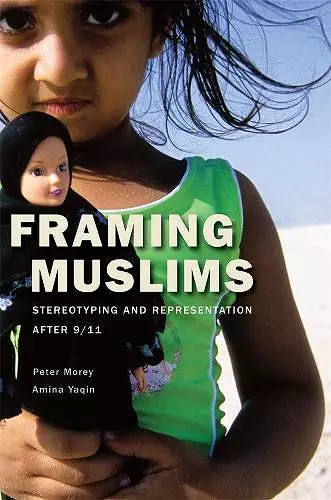Framing Muslims
Stereotyping and Representation after 9/11
Peter Morey author Amina Yaqin author
Format:Hardback
Publisher:Harvard University Press
Published:13th Jul '11
Currently unavailable, and unfortunately no date known when it will be back

In this rich and methodical deconstruction of the thick frame that surrounds nearly all discussions about Muslim minorities in British and American culture today, Peter Morey and Amina Yaqin have exposed the dark power of stereotyping Muslims to the light by scrutinizing everything from "terror" television shows to Muslim leaders' own stereotypes. As an example of cultural studies, the book is exemplary. As an intervention into some of the most urgent political debates of our day, it is both compelling and necessary. -- Moustafa Bayoumi, author of How Does It Feel To Be a Problem? Being Young and Arab in America Absorbing, disquieting, and compelling, Framing Muslims alerts us to the new and alarming ways that, in the aftermath of 9/11, 'Muslims' have come to represent a political problem waiting to be solved. With clarity, urgency and forensic skill, Peter Morey and Amina Yaqin explore and celebrate ways out of 'the frame' while unravelling the regulatory agendas of fanatics and liberal reformers alike that are currently breathing new life into discredited stereotypes. Essential wisdom for all who care and are daring to write about Islam, racism, and the politics of commodified multiculturalism today. -- Gerald MacLean, co-author of Britain and the Islamic World
In Framing Muslims: Stereotyping and Representation after 9/11, Peter Morey and Amina Yaqin dissect how stereotypes that depict Muslims as an inherently problematic presence in the West are constructed, deployed, and circulated in the public imagination, producing an immense gulf between representation and a considerably more complex reality.
Can Muslims ever fully be citizens of the West? Can the values of Islam ever be brought into accord with the individual freedoms central to the civic identity of Western nations? Not if you believe what you see on TV. Whether the bearded fanatic, the veiled, oppressed female, or the shadowy terrorist plotting our destruction, crude stereotypes permeate public representations of Muslims in the United States and western Europe. But these "Muslims" are caricatures—distorted abstractions, wrought in the most garish colors, that serve to reduce the diversity and complexity of the Muslim world to a set of fixed objects suitable for sound bites and not much else.
In Framing Muslims: Stereotyping and Representation after 9/11, Peter Morey and Amina Yaqin dissect the ways in which stereotypes depicting Muslims as an inherently problematic presence in the West are constructed, deployed, and circulated in the public imagination, producing an immense gulf between representation and a considerably more complex reality. Crucially, they show that these stereotypes are not solely the province of crude-minded demagogues and their tabloid megaphones, but multiply as well from the lips of supposedly progressive elites, even those who presume to speak "from within," on Muslims' behalf. Based on nuanced analyses of cultural representations in both the United States and the UK, the authors draw our attention to a circulation of stereotypes about Muslims that sometimes globalizes local biases and, at other times, brings national differences into sharper relief.
In this rich and methodical deconstruction of the thick frame that surrounds nearly all discussions about Muslim minorities in British and American culture today, Peter Morey and Amina Yaqin have exposed the dark power of stereotyping Muslims to the light by scrutinizing everything from "terror" television shows to Muslim leaders' own stereotypes. As an example of cultural studies, the book is exemplary. As an intervention into some of the most urgent political debates of our day, it is both compelling and necessary. -- Moustafa Bayoumi, author of How Does It Feel To Be a Problem? Being Young and Arab in America
Absorbing, disquieting, and compelling, Framing Muslims alerts us to the new and alarming ways that, in the aftermath of 9/11, 'Muslims' have come to represent a political problem waiting to be solved. With clarity, urgency and forensic skill, Peter Morey and Amina Yaqin explore and celebrate ways out of 'the frame' while unravelling the regulatory agendas of fanatics and liberal reformers alike that are currently breathing new life into discredited stereotypes. Essential wisdom for all who care and are daring to write about Islam, racism, and the politics of commodified multiculturalism today. -- Gerald MacLean, co-author of Britain and the Islamic World
Framing Muslims is an enlightening book. It is sure to make us more critical of the power and influence of media in shaping our views on Muslims and Islam. Peter Morey and Amina Yaqin deserve applause for their worthy effort. -- Joseph Richard Preville * Saudi Gazette *
Groundbreaking...Drawing on their diverse backgrounds in English and Urdu literary and cultural studies, Morey and Yaqin examine...[how] veils, beards, men at prayer, and minarets stand in for Muslims in all their heterogeneity and complexity...[An] illuminating work. -- Claire Chambers * Times Higher Education *
The book makes a notable contribution by going beyond events in the U.S. to examine reactions in Great Britain to the 2005 bombings of the London public transportation system. The authors take a psychoanalytic approach to their examination of the sources of stereotype and negative depiction, thus offering an interesting perspective that had not previously been fully explored. Furthermore, they consider the impact of positive stereotyping. They conclude that both positive and negative depictions of Muslims have revolved around religion, tradition, modernity, and 'clash of civilizations.' -- G. C. David * Choice *
- Nominated for Ray and Pat Browne Award - Best Single Work by 1+ Authors 2012
- Nominated for Anisfield-Wolf Book Awards 2012
- Nominated for René Wellek Prize 2012
- Nominated for PROSE Awards 2011
- Nominated for Morris D. Forkosch Prize 2012
ISBN: 9780674048522
Dimensions: unknown
Weight: unknown
256 pages